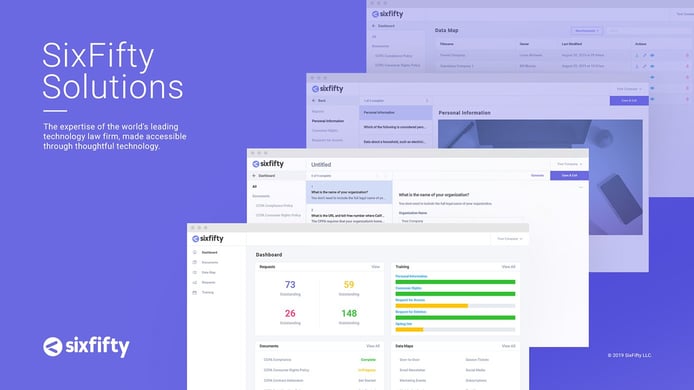
TL; DR: SixFifty takes the headaches out of making sure websites comply with strict and ever-changing privacy laws around the globe. The company’s several tools were created by law experts and reinforced by lawyers at Wilson Sonsini, a Silicon Valley law firm known for representing companies such as Apple and Google. The software allows companies to manage compliance documentation and stay abreast of changes to regulatory apparatuses and privacy laws across international borders. Sixfifty’s goal is to help businesses maintain compliance, all at a fraction of the cost of hiring an attorney.
In 2017, Kimball Dean Parker was the director of LawX, a legal design lab at Brigham Young University that aimed to simplify complicated legal issues for regular people at no cost.
The LawX team got to work on its first issue: making it easier to respond to lawsuits in Utah. At the time, the team found that around 80% of people sued for debt in the state did not respond and automatically lost the lawsuit.
LawX’s tool automated the response process, only requiring people to enter their information into the tool. The solution ended up being a smashing success, with 1,000 uses in just one month, earning Kimball and his team national recognition.
Wilson Sonsini, one of Silicon Valley’s top law firms, also took notice and reached out to Kimball to expand on his idea of automating legal processes.
That is how SixFifty was born.

Some of the top minds in the world of law have joined SixFifty to build tools that allow companies and websites to craft legal documents with just a few clicks. The software company’s innovations include tools for compliance with privacy laws such as the California Consumer Privacy Act (CCPA), the General Data Protection Regulation (GDPR) in Europe, and the Personal Information Protection Law (PIPL) in China.
“We scrape the brains of the best legal experts in the world and put it into an easy-to-use system,” Kimball said. “That’s the idea behind the company. It’s to turn the best legal expertise in the world into a product and sell it in a way that makes it more accessible to companies and people.”
Compliance for Large Corporations and Small Websites Alike
From the start, SixFifty’s mission has been to offer access to expensive legal tools at a fraction of the cost. Its tools are for big and small businesses alike.
By employing its tools, companies can take business globally without worrying about legal paperwork. And if a company wants to expand to a new market, SixFifty makes it easy to get compliance wherever the business is going.
The process is made simple, and blog posts on SixFifty’s website break down what the laws mean and how they can apply to a company’s business or website.
There is no pressure to purchase services, and companies can request a demo with SixFifty to see if its tools and processes are suitable for what they need.
“Our customers love the product,” Kimball said. “They tell us they haven’t ever had a good experience with the law before. They say it’s slow and cumbersome and costs a lot of money. We cut out all of that, and by using our tools, we can generate that document in as little as five minutes.”
Continued Support After Purchasing
Customer support does not end after a company purchases a plan and receives its legal documents. SixFifty makes sure to stay updated with the laws of countries around the world, and clients are notified if any changes come up after buying a plan.
The documents SixFifty offers are routinely checked and updated. That way, websites that use those documents stay compliant at all times. While anyone can take advantage of the company’s services, SixFifty says its emphasis is on helping small companies.
“It’s small companies that excite us the most, like the small California grocery store,” Kimball said. “It has to comply with the California privacy law. They don’t have access to resources like Google does. Many law firms charge more than $200,000 to help with the CCPA. We can help them for $10,000. We love that. Those are our favorite customers.”
Plans come with more than just legal documents. SixFifty’s tools include training for company employees on how to be compliant with privacy laws and ways to track progress, which is especially important with the CCPA in California, where proficiency with its privacy law is part of being compliant with it.

While SixFifty aims to simplify legal processes, it does not replace the role of a traditional law firm. The company wants to make small legal requirements easy to navigate while allowing lawyers at firms to handle the more significant issues.
“Lawyers think of themselves as chandelier makers,” Kimball said. “Complex, beautiful, legal. But in the end, most companies and people don’t need chandeliers. They need light bulbs. The problem is that lawyers charge chandelier prices for light bulbs. If you’re facing a big patent lawsuit that could destroy your business, you need a chandelier maker. But for most of your day-to-day stuff, you need expertise, but it’s not a chandelier.”
Making Access to Legal Resources Available to Everyone
The COVID-19 pandemic has brought massive changes to everyday life and has caused hardship to millions of Americans. SixFifty developed tools to help those who lost their job and struggled to keep a roof over their family’s head.
HelloLandlord.org helped regular people craft legal documents to send to landlords to stop evictions during the eviction moratorium without spending bundles of cash on lawyers.
SixFifty also developed HelloLender.org, which crafts legal documents for homeowners to get relief from lenders and delay payments without penalties or fines.
SixFifty’s free toolbox will soon include a tool for asylum seekers. When released, asylum seekers can use it to receive guidance and documents for the asylum process.
But SixFifty’s commitment to offering tools for legal processes does not end there. The company’s end goal is to automate every sector of law. Making these tools more accessible and gaining more customers will bring costs down in the long run.
“We’re going to do it methodically and area by area,” Kimball told us. “Once we move into an area, we will automate the entire sector. Soon, hopefully, we’ll have a very significant portion of the law automated, giving companies and people the chance to get affordable access to legal resources.”
HostingAdvice.com is a free online resource that offers valuable content and comparison services to users. To keep this resource 100% free, we receive compensation from many of the offers listed on the site. Along with key review factors, this compensation may impact how and where products appear across the site (including, for example, the order in which they appear). HostingAdvice.com does not include the entire universe of available offers. Editorial opinions expressed on the site are strictly our own and are not provided, endorsed, or approved by advertisers.
Our site is committed to publishing independent, accurate content guided by strict editorial guidelines. Before articles and reviews are published on our site, they undergo a thorough review process performed by a team of independent editors and subject-matter experts to ensure the content’s accuracy, timeliness, and impartiality. Our editorial team is separate and independent of our site’s advertisers, and the opinions they express on our site are their own. To read more about our team members and their editorial backgrounds, please visit our site’s About page.



